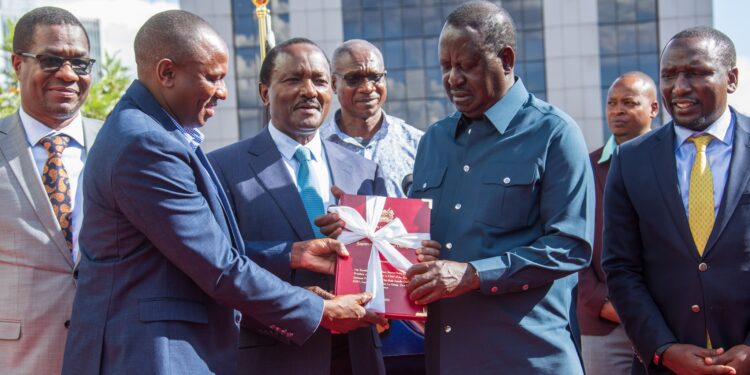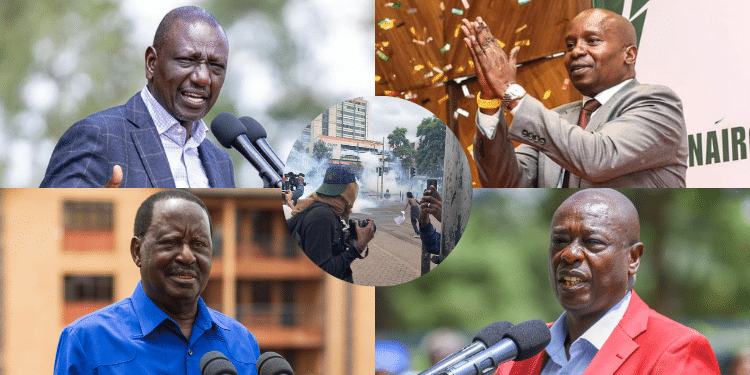Politics is part of the Kenya’s day-to-day activities. This year, the political landscape was marked by intense debates, alliances, and power plays that kept the nation engaged.
From government decisions to leadership transitions, each development contributed to shaping the country’s governance and socio-political direction.
These key moments were not only defined by those in power but also by the responses from the opposition, civil society and the people.
The key political actors of the happenings include President William Ruto, DP Kithure Kindiki, former DP Rigathi Gachagua, former Prime Minister Raila Odinga among others.

National Dialogue Committee
The National Dialogue Committee (NADCO) chaired by National Assembly Majority Leader Kimani Ichung’wa and Wiper Leader Kalonzo Musyoka handed over its report to President William Ruto on March 8.
On July 7, President Ruto signed into law the IEBC (Amendment) Bill, 2024.
The bill passed by Parliament is based on the recommendations of the NADCO report.
Raila, Kalonzo and Moses Wetangula attended the event.
Narc Kenya leader Martha Karua and DAP-L Party leader Eugene Wamalwa rejected the report.
Impeachment Cases
The Senate addressed three high-profile impeachment cases involving governors and deputy governors:
1.Kericho Governor Erick Mutai: Survived impeachment after 34 senators dismissed the charges of misconduct and abuse of office.
2.Kisii Deputy Governor Robert Monda: Impeached for bribery and constitutional violations.
3.Meru Governor Kawira Mwangaza: Faced her third impeachment motion, which the Senate upheld. However, the High Court temporarily halted the process.

Gen Z Protests
Gen Z protests erupted in June 2024 over the Finance Bill 2024 which proposed taxes on several common items, including bread, sanitary towels, motor vehicles, and mobile money transfers.
The movement gained momentum on social media under the hashtag #RejectFinanceBill2024 on X, Instagram, and TikTok.
Protesters Storm Parliament
The youth stormed Parliament buildings in Nairobi on June 25, where several people were shot dead, and others were injured.
This was immediately after MPs had debated and passed the bill.
The MPs who supported the bill were forced to flee for safety.
Speaking after the incident, President Ruto pledged said the government would conduct an investigation and punish the suspects.
“We must separate criminals from people exercising their constitutional right of expression,” he stated. Ruto labeled the anti-finance bill protests as ‘treasonous’ and directed security forces to ensure the safety of all Kenyans.

Ruto Drops Finance Bill
On June 26, President Ruto announced he would not sign the controversial Finance Bill 2024, citing ongoing conversations about its content.
“I concede, and therefore I will not sign the 2024 finance bill. The people have spoken,” Ruto said.
Following the withdrawal of the bill, Gen Z began demanding the resignation of President Ruto and his entire cabinet.
Ruto Disbands Cabinet
On July 11, Ruto eventually bowed to the pressure, dismissing his entire cabinet and the Attorney General.
Only Deputy President Rigathi Gachagua and Prime Cabinet Secretary Musalia Mudavadi were left in dismissal.
Also Read: Morara Kebaso Profile: Background, Education, Career and Family
Broad-Based Cabinet Politics
President Ruto later unveiled a broad-based cabinet, retaining some of his previous Cabinet Secretaries (CSs) while bringing in four members from the opposition party ODM.
CSs included Kipchumba Murkomen, Alfred Mutua, Rebecca Miano, Soipan Tuya, Aden Duale, Salim Mvurya, Prof. Kithure Kindiki, Alice Wahome, and Davis Chirchir.
Former Attorney General Justin Muturi was appointed to the Ministry of Public Service and Human Capital Development. From ODM, Ruto picked John Mbadi, Hassan Joho, Opiyo Wandayi, and Wycliffe Oparanya.

Rise of New Figures
The Gen Z protests catapulted several figures, including Gabriel Oguda, Boniface Mwangi, Shad Khalif, Osama Otero, and Drey Mwangi, who were key organizers.
Emerging leaders like Kasmuel McOure, Morara Kebaso and Hanifa Farsafi also gained recognition.
Raila AUC Bid
Raila’s bid for the African Union Commission (AUC) Chairperson position has also been on the headlines.
He is facing stiff competition from Djibouti Foreign Minister Mahmoud Ali Youssouf.
Also Read: Is Ruto Grooming Ndindi Nyoro as Gachagua’s Successor? Expert Weighs In
Gachagua’s Impeachment
Rigathi Gachagua was impeached by the National Assembly on October 8, and the Senate upheld the decision on October 17.
Kithure Kindiki was sworn in as deputy president on November 1.
President Ruto and his team have since faced hostility in Mt. Kenya.
On October 11, Nakuru Governor Susan Kihika encountered a hostile crowd during a funeral in Bahati constituency, where mourners rejected her attempt to read Ruto’s speech.
Moses Kuria, senior advisor in Ruto’s Council of Economic Advisors, was kicked off stage during a burial ceremony in Murang’a on November 23.
Ruto himself was booed by a crowd during the consecration and installation of Bishop Peter Kimani in the Embu Diocese on November 16.
Kalonzo as Opposition
After ODM members joined cabinet, Kalonzo has shaped himself as the opposition leader.
He has constantly called out the government on key issues like taxation and the recent Adani Group-JKIA takeover debate.
Follow our WhatsApp Channel and join our WhatsApp Group for real-time news updates.











































































